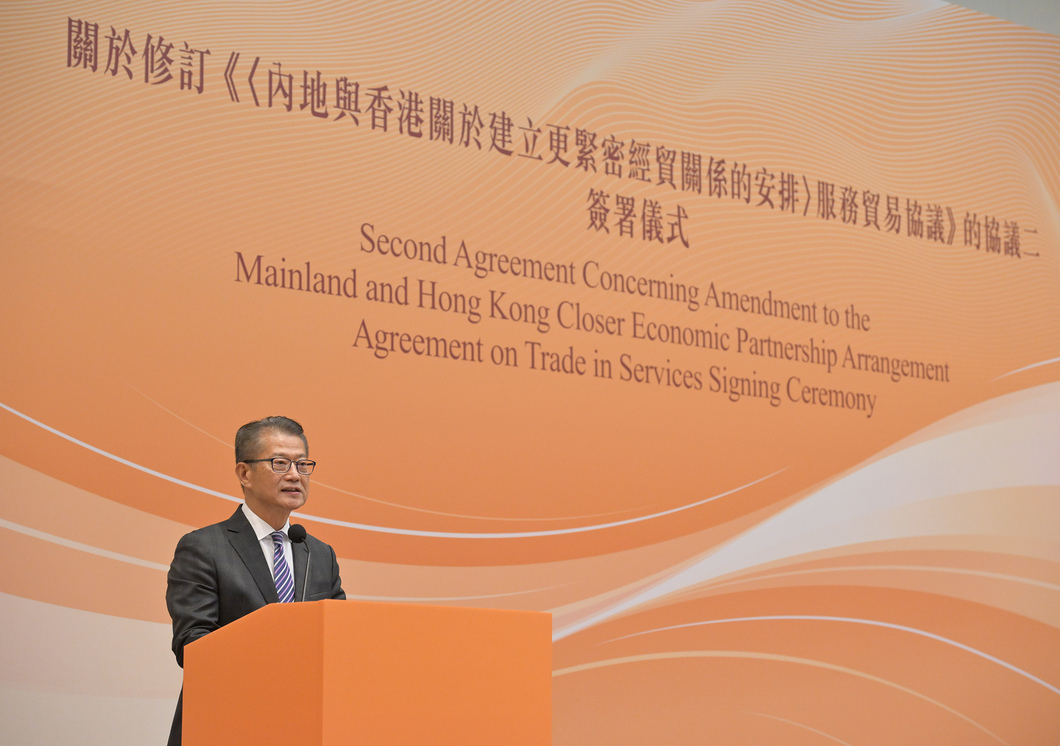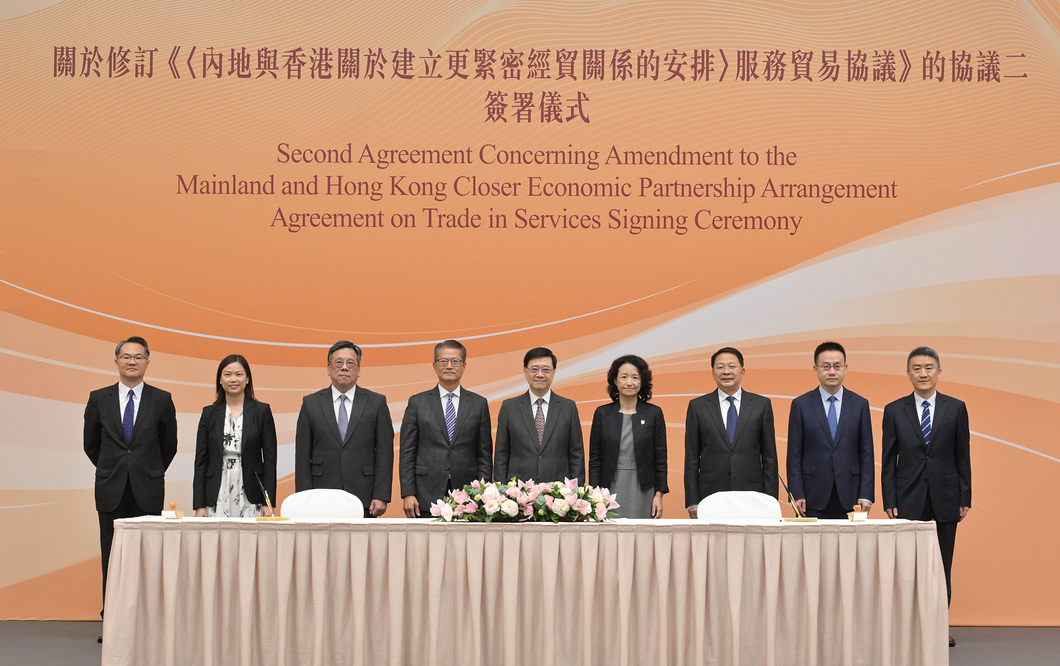Blog
Institutional Innovation Brings Mutual Benefits
Since the signing of the Mainland and Hong Kong Closer Economic Partnership Arrangement (CEPA) in 2003, it has effectively opened up convenient channels for various sectors and enterprises in Hong Kong to have priority access to the Mainland market for business development. In response to market demand and sectoral developments, as well as the overall economic development needs, CEPA has undergone continuous enhancements, ranging from facilitating trade in goods to deepening the liberalisation of trade in services. In 2015, under the CEPA framework, the Mainland and Hong Kong signed the Agreement on Trade in Services (the Agreement), which was an important milestone by essentially achieving liberalisation of trade in services between the two places. In 2019, further progress was made with the signing of the first amendment to the Agreement, with the inclusion of more liberalisation measures across multiple sectors.
Last week, the HKSAR Government and the Ministry of Commerce signed the second amendment to the Agreement. The Mainland has further lowered the market access thresholds in a number of service sectors in which Hong Kong enjoys competitive advantages, such as construction and related engineering, testing and certification, telecommunications, television, film, financial services, tourism services, etc. In addition, for most sectors, the requirement for Hong Kong service suppliers to engage in substantive business operations in Hong Kong for three years has been removed, allowing local start-ups and foreign companies established in Hong Kong to benefit from CEPA earlier.

|
| I attended and delivered remarks at the signing ceremony for the Second Agreement Concerning Amendment to the CEPA Agreement on Trade in Services last week. |
The new amendment agreement provides more preferential treatment for Hong Kong businesses and professionals to enter the Mainland market. More convenient, streamlined and efficient arrangements on trade in services will promote greater interaction between the two places – especially within the Guangdong-Hong Kong-Macao Greater Bay Area (GBA) – in terms of the flow of people, goods, and information. It also creates more business opportunities and growth prospects for related service sectors and professional service suppliers.
For example, for the financial services sector, the new arrangement removes the asset requirement of not less than USD2 billion in the immediate past year for a Hong Kong financial institution to invest in the shares of a Mainland insurance company. This will facilitate financial institutions of smaller scales to enter the Mainland's insurance market.
The amendment agreement also introduces "allowing Hong Kong-invested enterprises to adopt Hong Kong Law" and "allowing Hong Kong-invested enterprises to choose for arbitration to be seated in Hong Kong". In essence, they support Hong Kong-invested enterprises registered in pilot municipalities in the GBA to adopt Hong Kong law as the applicable contract law, and Hong Kong-invested enterprises registered in the nine municipalities in the GBA to choose Hong Kong as the seat of arbitration for resolving disputes. These new measures will help solidify Hong Kong's status as the centre for international legal and dispute resolution services in the Asia-Pacific region.
The relaxation of the requirement on the period of substantive business operations, and the introduction of “allowing Hong Kong-invested enterprises to adopt Hong Kong Law" and "allowing Hong Kong-invested enterprises to choose for arbitration to be seated in Hong Kong", will all encourage foreign enterprises to choose Hong Kong as their premier base in developing the Mainland market. This will facilitate the attraction of investments and bring more employment opportunities to Hong Kong.
Regarding the tourism industry, two major enhancement measures will strengthen Hong Kong's position as an international tourism hub. First, the 144-hour visa-exemption policy for foreign tour groups entering Guangdong via Hong Kong, which previously applied only to the Pearl River Delta region and Shantou, has been expanded to cover the entire Guangdong Province. The number of inbound control points where this visa-exemption policy applies has also increased. In view of this enhancement measure, the Hong Kong tourism industry can develop more diversified "multi-destination" tourism products targeting foreign visitors, thereby attracting more international tourists. Second, Mainland visitors entering Hong Kong to participate in international cruise itineraries involving port-of-call in the Mainland cruise ports can enjoy more convenient immigration procedures. This will attract cruise companies to develop more cruise itineraries with Hong Kong serving as the homeport, and promoting cruise cooperation between Hong Kong and the Mainland.
It is worth noting that, since July this year, non-Chinese Hong Kong permanent residents have been able to apply for a card-type travel permit allowing multiple entries to the Mainland over a five-year period. This facilitates business trips and visits to the Mainland for tourism purpose. According to the National Immigration Administration (NIA), as of early this month, the China Travel Service (Hong Kong) Limited had received around 48,000 applications for the card, and approximately 16,000 cards had been issued by NIA.
This measure, combined with the new CEPA amendment agreement, will further enhance Hong Kong's competitiveness as the regional headquarters for companies. By lowering the market access thresholds for Hong Kong-invested enterprises and relaxing qualification requirements in professional services sectors such as financial services and legal and arbitration services, more foreign companies and professional service firms will be attracted to use Hong Kong as a base for entering the Mainland market. Meanwhile, providing entry convenience for non-Chinese Hong Kong permanent residents will attract more overseas talents to choose Hong Kong as their base to access the Mainland.
During my recent overseas trips to promote Hong Kong's business environment and its advantages as a talent hub, I found that our international partners widely recognise the "one country, two systems" arrangement as Hong Kong's most significant and unique edge. It encourages overseas enterprises to actively consider Hong Kong as a regional base for expanding into the GBA, the entire Mainland, ASEAN, and other Asian markets. The latest amendments to the CEPA Agreement on Trade in Services further highlight Hong Kong's strengths and attractiveness in services trade and professional services. It will enhance Hong Kong's role in deepening economic and trade cooperation between the Mainland and the world, and strengthen our functions as a "super connector" and "super value-adder."
October 13, 2024











